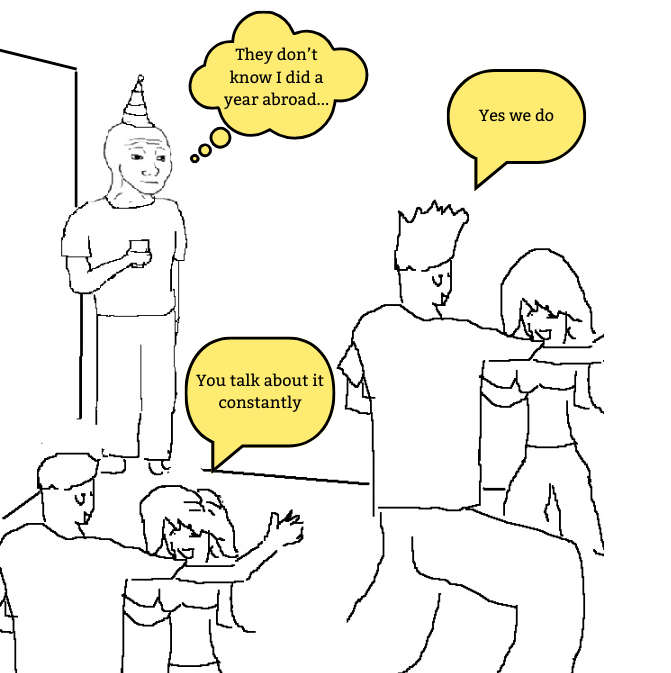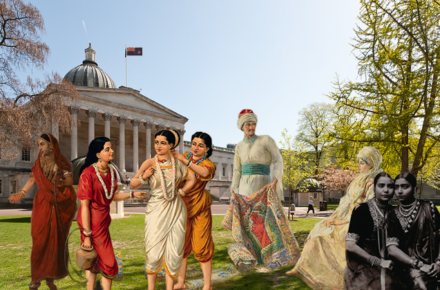

Are you thinking of taking a year abroad?
Do you want to swap George Farha for a macchiato and a cigarette? Is your greatest wish to be the most insufferable person at pres because, I’ll have you know, that Lidl wine would taste so much better in Bordeaux? As seems to be the destiny of every Erasmus+ student, I have just returned from studying abroad in Paris and must tell everybody about it. It was one of the best experiences of my life, but it was certainly daunting, and quite frightening to begin with. UCL has been known to throw students in the deep end sometimes. Somewhat inevitably, with over 500 people needing help with travel to about 35 different countries, not everyone’s questions get answered. Whether you are a fresher, joining a language degree, or considering adding a year abroad to another one, hopefully, this article can shed some light on the process.
Preparing to leave takes a surprising amount of brainpower. Not only is getting a visa unbelievably frustrating, but packing is also quite confusing. Luckily, I was pretty familiar with travelling in Europe so I didn’t do much “moving to france what shld i bring” Googling, but never underestimate a good Quora or Reddit page. UCL tells you to pack less than you think because you won’t need it all. This is true, but more importantly, you might suddenly have access to European Vinted and will need the valuable space to cart back entire wardrobes from chic Spanish grandmas. You might also be such a good person that you help your friends pack up at the end of the year, thereby inevitably acquiring anything they can’t fit into their suitcases.
Actually making the trip is also relatively difficult. I procrastinated buying my Eurostar ticket for so long it felt like I was going to have to take out a mortgage to get one, until someone happened to text me about the £35 sale an hour before it ended. I then kept missing the subsequent sales, so, annoyingly, most of my travel was at full price, but the lesson is keep an eye out for discounts! I would also recommend taking the more comfortable mode of transportation to move in, even if it is more expensive. You can take the FlixBus literally any other trip, don’t do it to yourself on the first one.
The adjustment to a new country, language, and culture is going to be difficult, there is no way around it, but this does not mean you are doomed to a friendless year alone. When I got to Paris, I quickly realised the French did not really do societies or an induction week in the same way as UK universities. They also didn’t do clear timetables or logical administration, but that was a different issue. Luckily, there was a university association specifically created to welcome international students. This group, aptly named Parismus, was super useful in the first few weeks of term. French students acted as tour guides, shepherding us around tourist sites, and, of course, set up apéro nights. Friends in other countries had similar experiences, so it’s worth checking out in your preferred destination!
Obviously, everyone’s experience will be different, but I found my year abroad allowed me to branch out from normal habits and try something new! It wasn’t just that I could take a wider range of courses than at UCL but that there was so much to explore outside the university, and I had time to do it. In France, for example, many of the museums are free for under 25s, and both cinemas and public pools offer similar discounted tickets. The Paris metro even has a cheap, unlimited student price year pass that extends into towns around it — Sadiq Khan, I am begging you, bring a similar system to London. Wherever you go, however, there will be run clubs, life-drawing classes, and even poetry nights with the main purpose of introducing people; I found most advertised on Instagram! Showing up to something by yourself is the hardest thing a person can do, but you can do it (and you kind of have to, a couple of times).
Ultimately, a year abroad feels like freshers on steroids, with similar opportunities for new experiences. It sounds very primary-school, but it’s a great way to build independence, confidence, and resilience! It will be hard at some points, and you will get through them anyway. It is important to remember that it only lasts 10ish months and it’s probably the freest you will be for a while!
I truly believe that everybody, regardless of their degree, should take a year abroad, not least because afterwards you’ll get invitations across the world from any international friends you make (and a free place to stay!). Travelling is such a good way to build knowledge and empathy, and stepping outside your comfort zone will improve your understanding of the world, and yourself. Once you have become better and more worldly than everyone else in your cohort, you also get to talk about it for the rest of your life, and people will only find you mildly annoying. If this article has done nothing but make me seem pretentious, I hope some study abroad propaganda has worked, and the year seems a little less daunting.
This article appeared in CG93








